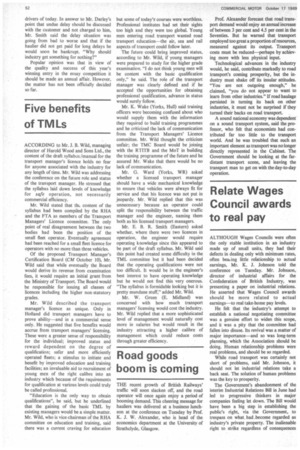Five benefits of TMLs
Page 54

If you've noticed an error in this article please click here to report it so we can fix it.
ACCORDING to Mr. J. B. Wild, managing director of Harold Wood and Sons Ltd., the content of the draft syllabus /manual for the transport manager's licence holds no fear for anyone associated with the industry for any length of time. Mr. Wild was addressing the conference on the future role and status of the transport manager. He stressed that the syllabus laid down levels of knowledge for safe operation, not necessarily commercial efficiency.
Mr. Wild stated that tht.. content of the syllabus had been compiled by the RHA and the FTA as members of the Transport Managers' Licence committee. The only point of real disagreement between the two bodies had been the position of the small fleet operator. Eventually agreement had been reached for a small fleet licence for operators with no more than three vehicles.
Of the proposed Transport Manager's Certification Board (CM October 10), Mr. Wild said that while eventually the Board would derive its revenue from examination fees, it would require an initial grant from the Ministry of Transport. The Board would be responsible for issuing all classes of licences including the higher non-statutory grades.
Mr. Wild described the transport manager's licence as unique. Only in Holland did transport managers have to prove ability—and in a commercial sense only. He suggested that five benefits would accrue from transport managers' licensing. These were a greater sense of responsibility for the individual; improved status and reward dependent on the degree of qualification; safer and more efficiently operated fleets; a stimulus to initiate and benefit by improved education and training facilities; an invaluable aid to recruitment of young men of the right calibre into an industry which because of the requirements for qualification at various levels could truly be called professional.
"Education is the only way to obtain qualifications", he said, but he underlined that the gaining of the basic TML by existing managers would be a simple matter. Mr. Wild, who is vice-chairman of the RHA committee on education and training, said there was a current craving for education but some of today's courses were worthless. Professional institutes had set their sights too high and they were too global. Young men entering road transport wanted road transport education—the air, sea and rail aspects of transport could follow later.
The future could bring improved status, according to Mr. Wild, if young managers were prepared to study for the higher grade examination. "I do not think young men will be content with the basic qualification only," he said. The role of the transport Manager was clearly defined and if he accepted the opportunities for obtaining professional qualification, advance in status would surely follow.
Mr. K. Wake (Yorks, Hull) said training officers were becoming confused about who would supply them with the information they required to build training programmes and he criticized the lack of communication from the Transport Managers' Licence committee. Mr. Wild thought the criticism unfair; the TMC Board would be joining with the RTITB and the MoT in building the training programme of the future and he assured Mr. Wake that there would be no lack of communication.
Mr. G. Ward (Yorks, WR) asked whether a licensed transport manager should have a wide mechanical knowledge to ensure that vehicles were always fit for service and that his licence was not put in jeopardy. Mr. Wild replied that this was unnecessary because an operator could split the responsibility between the traffic manager and the engineer, naming them both as his licensed transport managers.
Mr. E. B. R. Smith (Eastern) asked whether, where there were two licences in operation, the engineer would require operating knowledge since this appeared to be part of the draft syllabus. Mr. Wild said this point had created some difficulty in the TML committee but it had been decided that the operating qualifications were not too difficult. It would be in the engineer's best interest to have operating knowledge but he would not find this very onerous. "The syllabus is formidable looking but it is pretty mundane stuff," added Mr. Wild.
Mr. W. Green (E. Midland) was concerned with how much transport managers' licensing would cost the industry. Mr. Wild replied that a more sophisticated level of management would naturally cost more in salaries but would result in the industry attracting a higher calibre of management which could reduce costs through greater efficiency.




























































































































